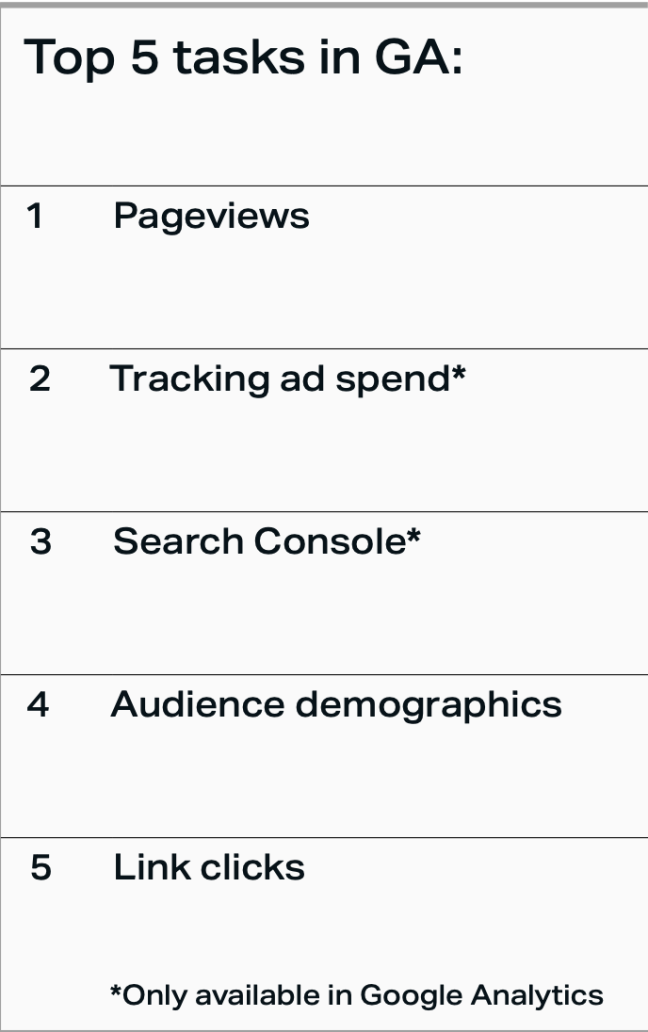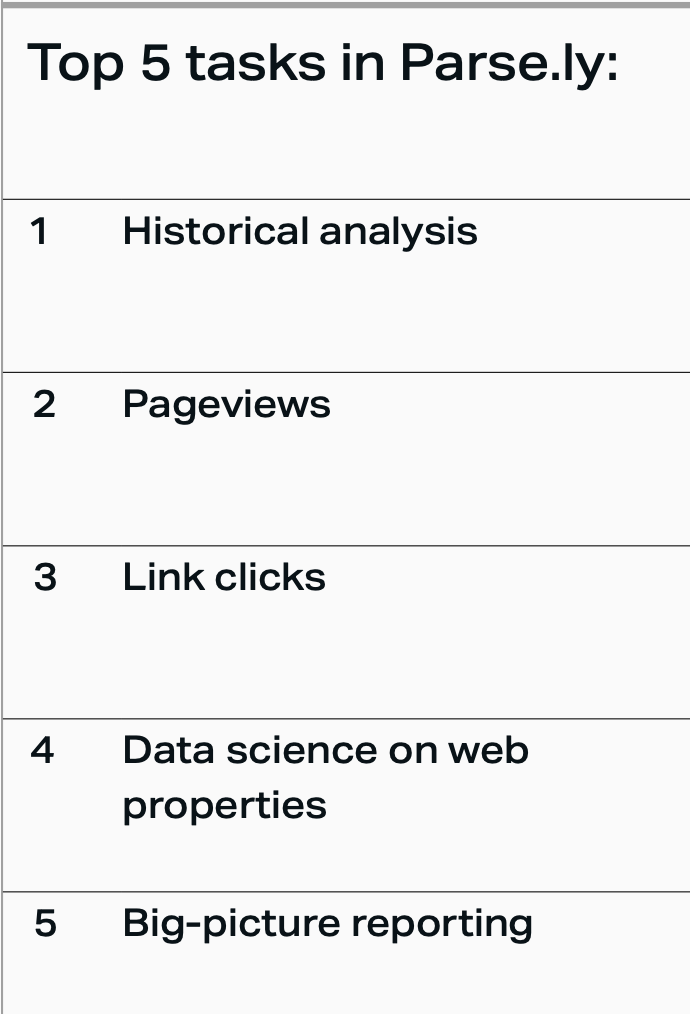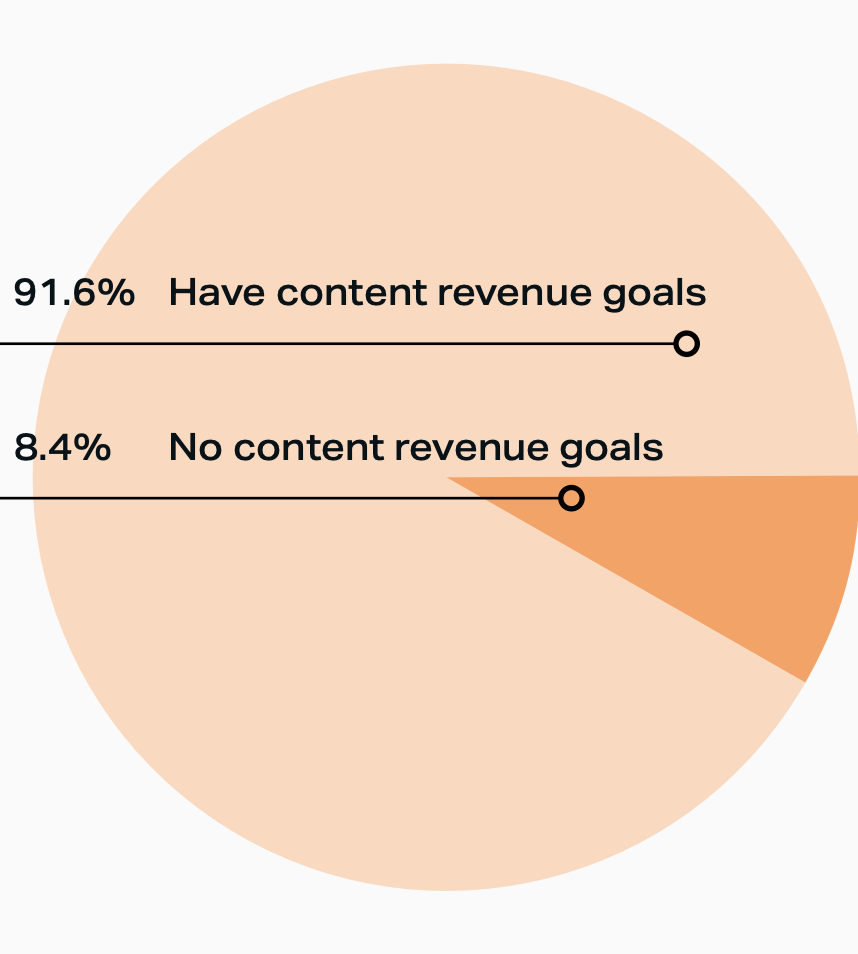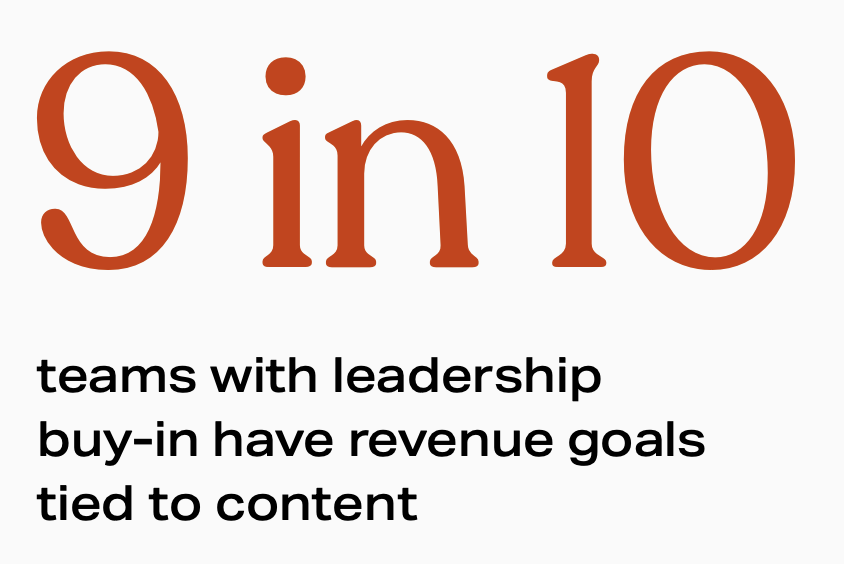The Content Marketer’s Guide to Getting a Raise

Content is king and knowledge is power, but can mastering both literally pay off for a content marketer come performance review season?
Yes, like a boss.
Showing that your marketing is in lock-step with company goals and KPIs by speaking the language of the business is a winning approach for content marketers looking to not only prove content’s worth but theirs as well.
You’ll transform soft, vague goals like “produce 50% more content in Q2” or “write a dozen blog posts next year” into business-tangible OKRs like “drive 50% more qualified leads from content in Q2.”
And in the bargain, it’s a pathway to banking a nice salary raise for a “job well done.” After all, your execs typically have quarterly or annual performance incentives, i.e., bonuses, in their contracts based not on “feel good” results but “bottom line growth.”
In fact, we learned from our Content Matters 2023 Salary Report that leadership buy-in results in an average salary of $5,000 more per year.
So, why not you, humble Content Marketer?
It may be time to sign up for a set of content marketing-focused OKRs (more on those next), get used to reporting on “metrics that matter,” and prove your true value to the business.
What’s an OKR, anyway?
OKR stands for Objectives and Key Results.
According to leadership experts WhatMatters.com, “OKRs are an effective goal-setting and leadership tool for communicating what you want to accomplish and what milestones you’ll need to meet in order to accomplish it. It is a collaborative goalsetting methodology used by teams and individuals to set challenging, ambitious goals with measurable results.”
To bring a more quantitative means to evaluate employees and teams, OKRs are agreed upon objectives and measurable results between management and employee.
For a content marketer, imagine an OKR like this:
“I will raise audience engagement with our content by 25%, drive 10% more referrals and qualified leads from content, and become data-driven to decide which content we should produced more of this year.”
Those are certainly attention-grabbing objectives that will make management sit up and take notice. Now, how do you accomplish this? It takes more than looking under the hood in Google Analytics or an email automation platform like Marketo or Pardot.
Think content analytics.
Ready to sign-up for your own content marketing-focused OKRs?
Here is the OKR formula:
OKRs are typically written with an Objective at the top and three to five supporting Key Results below it. They can also be written as a statement: “I will (Objective) as measured by (Key Results).” For example, “I will fix the website for the vast majority of people as measured by 7 out of 10 people being able to get through, a 1 second response time, and a 1% error rate.
Career advice
First, let’s do some career level setting. According to our Content Matters 2023 Salary Report, the average yearly salary (in USD) for an individual content marketing contributor is about $92,000.
But we also learned from this report that content marketers who use content analytics tools make substantially more than those who don’t (up to 5.5% more for those using leading content analytics platform Parse.ly).
Knowing how your content is performing means you can also prove the value of your work and make the case for more money. According to jobsite Indeed, here are 10 Tips To Prove You Deserve a Raise at Work:
- Take initiative
- Maintain a positive attitude
- Keep learning
- Set goals for your career
- Set reasonable expectations
- Schedule a meeting
- Communicate clearly
- Be patient
- Pick the right time
- Get endorsements
These are certainly broad, reasonable steps, but here’s what’s clearly missing:
- Quantitatively proving your worth

On the other hand, professional recruitment consultancy Michael Page addresses that with its 5 Bulletproof Ways to Get the Pay Raise You Deserve advice. Bullets two, three, and five have particularly relevant nuggets of career wisdom (boldfacing added for emphasis):
- Skill up to get ahead. You don’t get any prizes for being shy. Spell out how you plan to translate your new knowledge and skills into benefits for the business so they can clearly see the value you are adding.
- Go above and beyond. To prove you deserve more, you need to regularly surpass your KPIs—and keep a record of it. The key word here is metrics—gather revenue figures, customer feedback, and growth statistics to show how your performance is reaping dividends for the business.
- Team leadership. Successfully securing a pay rise depends on two key factors—clearly quantifying your contribution to the company, and building a bulletproof case.
- Business benefits. If you’re proactive when it comes to accelerating the business, you should detail these initiatives to your employer and show them the tangible results.
- A case for innovation. Your best chance of reaping monetary benefits is making your employer aware of your true value to the business. That could be upskilling, going above and beyond your targets, or bringing in new clients for the business.
Now let’s translate those into working, thematic OKRs.
It pays to use data
The efficacy of using analytics is proven in our Content Matters 2023 Salary Report where we learned companies that use content analytics tools pay higher salaries than those that don’t. In fact, users of Parse.ly Analytics earn almost 6% more, on average.
Content Marketer OKR 1: Focus on the right metrics and ignore the rest
Marketing teams aren’t short of measurement tools. But are they using the right metrics and the right tools? Pageviews and email clicks, so-called “vanity metrics,” offer little hard analysis of how your content is performing—and don’t tell the full story of a customer’s lifecycle journey.
As we learned from our Content Matters 2023 Report, 24% of content marketers still don’t have a clear picture of how their content is performing, even if they’re using analytics tools.
Instead of pageviews, consider these five metrics to track:
- Traffic
- Conversions
- Engaged time
- Keyword ranking
- Backlinks
Notice, no mention of the standard email open rates or clickthrough rates.
These go a long way in providing a full picture of how your content influences your business’s bottom line, e.g., conversion events like subscription sign-ups and lead generation form-fills. And how well your content influences those events. How long users spend reading your content or which content drives the most unique sets of eyeballs to your site are insights worth trumpeting during team Zoom calls, hallway conversations with the CMO, and performance reviews.
Action item: Audit the content metrics (if any) you are tracking, compile a short list of what’s missing in the mix, and note what intelligence would help you better prove your content’s impact.

of those with content revenue goals have a clear understanding of content performance, compared to only 10% of those without revenue goals


of those who measure their content still don’t have a clear picture of performance, regardless of goals
Content Marketer OKR 2: Report on content impact and ROI with a tool built for the job
Now, here’s some bad news. Google Analytics simply wasn’t built for content marketing teams. That’s why marketers tend to jump through tons of hoops just to get some sense of content return on investment (ROI). Instead, they should turn to an analytics solution designed for content marketing from the ground up.
Why? Because real metrics and data-driven insights are your BFF in the quest for that raise.
Content-focused analytics tools are specifically designed for content marketers and content-driven businesses to track their efforts. For example, with Parse.ly, you can more accurately and meaningfully define content marketing ROI and rely on that data to make content strategy decisions—and improve your content’s performance.
Legacy analytics tools haven’t caught up with the modern content marketing approaches companies now require. Because content is seen as a valuable tool for revenue growth, brand awareness, customer education, and building trust, those vanity metrics don’t cut it in 2022. In short, It’s time to move beyond content strategy decisions derived by holding a finger to the wind.
Action item: Start exploring and researching purpose-built content analytics solutions; ask for recommendations from peers at other organizations.
A real-world win, courtesy of Parse.ly
As a reporter at City News, a large media organization, Luis* had always felt like his job was on shaky ground. In an era where print publications are struggling, he knew that every story he wrote had to perform well to justify his position. That’s why he was so excited when his company adopted Parse.ly. Now, he could see for himself how his stories were performing.
With the help of Parse.ly, Luis learned that his stories were consistently among the top-performing articles on the site, based on metrics like pageviews, engagement, and social media shares, compared with those of other staff writers.
For his annual review, Luis came armed with that data, proving just how valuable his work as a journalist was to the company. By pointing to the business KPIs that his stories had contributed to, he could make a compelling argument for a raise, and even a promotion.
*Company and customer names have been anonymized.

Content Marketer OKR 3: Align metrics with business KPIs
The best content marketers don’t work in a silo—they understand how their work contributes to the company bottom line. That helps them create compelling content that gets readers to take action, i.e., convert, buy, etc. Consistent and targeted metrics are how revenue marketing leaders like CMOs and CROs communicate their intentions to the rest of the department—and their bosses.
Leadership can’t run a business on clicks and pageviews, which are easy to source but tell only a small part of the content marketing story. To keep the business on track against company goals and measure marketing’s contribution, marketing and sales leaders look at Key Performance Indicators (KPIs) like leads, opportunities, pipeline, and close/won for deals.
“Everyone’s in sales,” as the business maxim says. So, Content Marketer, put your sales cap on. Measure the performance of your content using sales-driven metrics like audience engagement, conversions, and number of leads generated. This will help you decide what content to do more of (and less of), rather than reactively responding to “off the cuff” requests—as almost half of marketers do, according to our Content Matters 2023 Report. Best of all, you’ll have the data to back up your decision making, without resorting to gut feel.
To amplify conversions, you need to be able to tie your content to the revenue-related actions readers take on your site. Content analytics, not guesswork, helps you do that.
Come budget time, this insight is a must to justify increased content marketing spend, whether it’s hiring more marketers or spending more on popular content distribution channels like Facebook or LinkedIn.
Action item: See what content drives conversions, and do more of that. Not sure which KPIs to focus on? Consider looking at audience engagement as your North Star metric for success.
“Content marketing isn’t just a part of the big-picture marketing strategy anymore. All marketing is content marketing.”
Nick Gernert, CEO, WordPress VIP
Content Marketer OKR 4: Justify your value—and content’s— to the organization
Are you undervaluing your work, Content Marketer? You probably don’t yet know how much content matters to your organization.
To be fair, decision-makers aren’t always familiar with content’s role in marketing. Justifying the role of content often arises in budget conversations, goal- and OKR-setting sessions, and performance reviews. It’s best to go in with the expectation and confidence to tackle these doubts head-on.
You can do this in a few ways:
- Cite content marketing statistics from industry sources. WordPress VIP, CMI, and MarketingProfs boast annual reports, infographics, and resources galore to reference, by industry and B2B/B2C markets as applicable. Choose relevant statistics whenever you’re building your case for a raise.
- Map the success of past content pieces you’ve created or launched. What made your blog posts or long-form assets successful? For example, “This blog post got two backlinks within a month of publishing, bumping the domain authority of our site from 50 to 60 in the course of a quarter.” Don’t be shy about citing big wins—“Be like Luis.”
- Did a bottom-of-funnel post get cited in anecdotal sales conversations as how the lead learned about your company or helped close a big deal? Not every metric needs a digital origin.
- Show historical data. Charting movement on things like sales conversions, overall traffic, and engagement. Relate how much effort, time, and investment was poured into the content marketing along the way to achieve up-and-to-the-right trends.
Action item: Make content analytics your friend, sourcing both digital and offline anecdotal wins.
The $$$ pay off to all this
Once upon a time, the term BHAG was business jargon du jour. It stood for Big Hairy Audacious Goal—“meant to excite and energize people in a way that quarterly targets and lengthy mission statements often fail to,” according to Investopedia. BHAGs were often proposed by leadership to inspire the troops to do more, even the seemingly impossible.
Today, signing up for and then staring down a set of content marketing OKRs may initially feel like a collection of BHAGs.
Remember, successfully securing a pay raise depends on clearly quantifying your contribution to the company, making your employer aware of your true value to the business, and citing statistics to show how your performance is reaping dividends for the business.
That shouldn’t strike fear into your soul, Content Marketer. Not only should the OKR payoff be a bigger paycheck for hitting your goals but the satisfaction you’re proving the worth of your work and the power of content to drive business.
Good luck!






